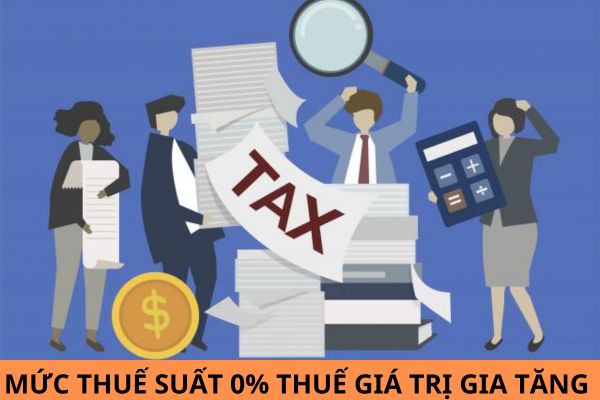To whom does the 0% value-added tax rate apply in Vietnam ?
To whom does the 0% value-added tax rate apply?
According to Clause 1, Article 8 of the Law on Value Added Tax 2008, amended by Clause 3, Article 1 of the Law amending Law on Value Added Tax 2013, further modified by Clause 2, Article 1 of the Law on amendments to some Articles of the Law on Value-added tax, the Law on special excise duty, and the Law on Tax administration 2016, the tax rates are prescribed as follows:
Article 8. Tax rates
1. The 0% tax rate applies to exported goods and services, international transportation, and goods and services that are not subject to value-added tax as stipulated in Article 5 of this Law when exported, except for the following cases:
a) Transfer of technology, transfer of intellectual property rights abroad;
b) Reinsurance services provided to foreign entities;
c) Credit granting services;
[...]
Thus, the entities to which the 0% tax rate applies include exported goods and services, international transportation, and goods and services not subject to value-added tax when exported, except for the following cases:
- Transfer of technology, transfer of intellectual property rights abroad;- Reinsurance services provided to foreign entities;
- Credit granting services;
- Capital transfers;
- Financial derivative services;
- Postal and telecommunications services;
- Exported products stipulated in Clause 23, Article 5 of the Law on Value Added Tax 2008.
Exported goods and services are goods and services consumed outside Vietnam, in non-tariff zones; goods and services supplied to foreign customers as stipulated by the Government of Vietnam.

To whom does the 0% value-added tax rate apply in Vietnam? (Image from the Internet)
Do taxpayers have the right to request the tax authority to confirm their tax obligations in Vietnam?
According to Article 16 of the Law on Tax Administration 2019 that stipulates taxpayers' rights in Vietnam:
Article 16. Rights of taxpayers
[...]
- Receive decisions on tax handling, tax examination records, tax inspection records, request explanations on the contents of tax handling decisions; preserve their opinions in the tax examination records, tax inspection records; receive written conclusions on tax examination, tax inspection, tax handling decisions after examination or inspection by the tax administration agency.
- Be compensated for damages caused by the tax administration agency or tax officials in accordance with the law.
- Request the tax administration agency to confirm the fulfillment of their tax obligations.
- File complaints, lawsuits against administrative decisions, administrative actions related to their legitimate rights and interests.
[...]
According to the above regulation, requesting the tax administration agency to confirm the fulfillment of their tax obligations is one of the taxpayers' rights. Therefore, taxpayers have the right to request the tax administration agency to confirm the fulfillment of their tax obligations.
What are the responsibilities of taxpayers?
According to Article 17 of the Law on Tax Administration 2019, taxpayers have the following responsibilities:
- Conduct taxpayer registration, use tax codes as stipulated by the law.
- Accurately, truthfully, and fully declare taxes and submit tax records on time; be responsible before the law for the accuracy, truthfulness, and completeness of tax records.
- Pay taxes, late payment interests, fines fully, on time, and at the correct location.
- Comply with accounting, statistical policies, and manage, use invoices and documents as stipulated by the law.
- Precisely, truthfully, and fully record activities that generate tax obligations, tax deductions, and transactions that must declare tax information.
- Prepare and provide invoices, documents to buyers according to the actual number, type, and value paid when selling goods and providing services as stipulated by law.
- Provide accurately, fully, and promptly information and documents related to the determination of tax obligations, including investment value information; account number and transaction content of accounts opened at commercial banks or other credit institutions; explain tax calculation, tax declaration, and tax payment upon request by the tax administration agency.
- Comply with decisions, notifications, and requests of the tax administration agency, tax officials as stipulated by the law.
- Be responsible for fulfilling tax obligations according to the law in case the legal representative or authorized representative of the taxpayer performs tax procedures incorrectly.
- Taxpayers conducting business activities in areas with adequate information technology infrastructure must declare, pay taxes, and transact with the tax administration agency through electronic means as stipulated by the law.
- According to actual conditions and information technology availability, the Government of Vietnam stipulates in detail that taxpayers are not required to submit documents in tax declaration, tax payment records, tax refund records, and other tax records that the state management agencies already have.
- Build, manage, and operate technical infrastructure systems to ensure electronic transactions with the tax administration agency, apply information connection related to tax obligation fulfillment with the tax administration agency.
- Taxpayers with related party transactions have the obligation to prepare, store, declare, and provide documentation on taxpayer information and related parties’ information, including information on related parties residing in countries and territories outside Vietnam as stipulated by the Government of Vietnam.










